The Sabbath begins at 7:50 P.M. on Friday, September 2, and concludes at 9:03 P.M. on Saturday in the Vilnius region.

Lithuanian Jews Oppose Any Commemoration of Kazys Škirpa

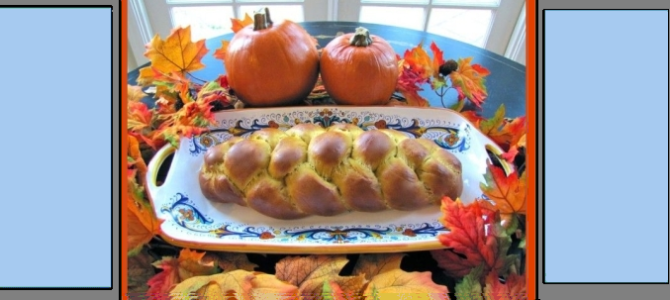
The Sabbath begins at 7:50 P.M. on Friday, September 2, and concludes at 9:03 P.M. on Saturday in the Vilnius region.
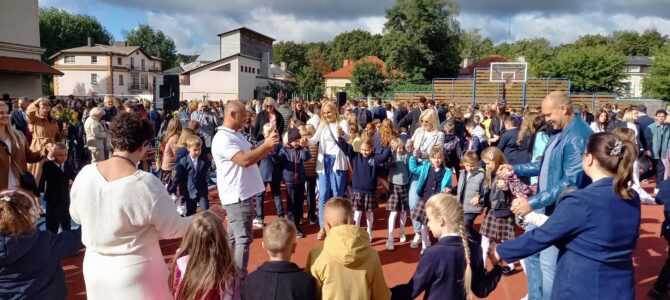
The Lithuanian Jewish Community greets the students, parents and teachers of the Sholem Aleichem ORT Gymnasium in Vilnius and all our students and parents on September 1, the national back-to-school holiday. We wish you a very successful academic year.
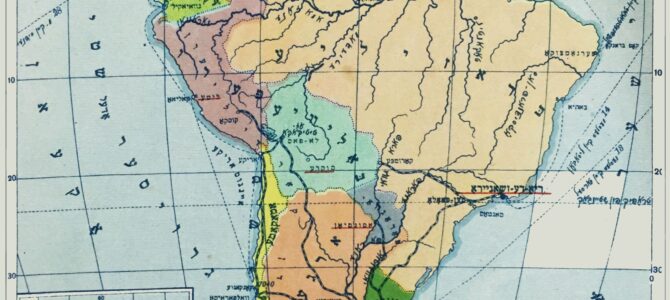
by Javier Sinay
A newly translated book spotlights the country’s long-forgotten Jewish journalism, and the immigrants who shaped it
In February of 1898, 4,824 immigrants arrived at the port of Buenos Aires: 2,919 Italians, 1,284 Spaniards, 166 French, 137 Turks, 84 Russians, 47 Austrians, 46 Germans, 42 Brits, 35 Portuguese, 23 Swiss, 15 Belgians, 13 Moroccans, five Americans, four Danes, three Swedes, and one Dutch. In Buenos Aires, 1 out of every 2 people on the streets had been born elsewhere, at least one ocean away.
Many of these communities had their own newspapers; the Jewish community did also. We know a lot about Argentina’s Yiddish pioneers thanks to Pinie Katz, a journalist who years later, in 1929, published in Buenos Aires a book titled Tsu der geshijte fun der idisher dyurnalistik in Argentine (with a Spanish title, Apuntes para la historia del periodismo judío en la Argentina), which tells the story of the Jewish press in Argentina between 1898 to 1914. That last year, David Goldman wrote in his book Di Yuden in Argentine (Jews in Argentina) that there was a “mass of corpses in Argentina’s literary cemetery,” referring to the high number of newspapers that were short-lived. Goldman calculated that up until 1914, some 40 newspapers had sprung up, and in 1951 the magazine Der Shpigl defined that early period as “the heroic era of Jewish journalism” in Argentina.
In his book, Pinie Katz told us about those restless Quixotes and their newspapers, their reports, their intrigues, the debates they prompted within the community, and their relationship to Argentine society. Over the years, however, Katz and the pioneers he chronicled became figures blurred by time, or as in most cases, completely forgotten. This was especially true given that they wrote and published in Yiddish, which isolated them from anyone who didn’t speak the language. Now, though, we have translated Katz’s book into Spanish, appearing under the title La caja de letras: Hallazgo y recuperación de “Apuntes para la historia del periodismo judío en la Argentina”, de Pinie Katz, or The Box of Letters: Discovery and Recovery of “Notes for a History of Jewish Journalism in Argentina,” by Pinie Katz.
Full story here.
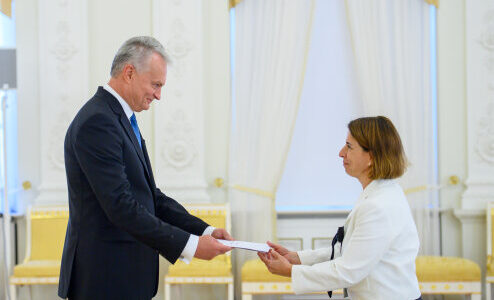
Lithuanian president Gitanas Nausėda has received and accepted the credentials of Israeli ambassador Hadas Wittenberg Silverstein. The head of the Lithuanian state said he was happy with increasing connections between the Republic of Lithuania and Israel. The two discussed the future of possible bilateral relations with a focus on innovative research and technologies, education and tourism, and also military cooperation in the two countries’ respective defense industries. The Lithuanian president noted wonderful cooperation at international bodies and Lithuania’s support for better dialogue between Israel and the European Union. Lithuania and Israel this year celebrate 30 years of diplomatic relations.
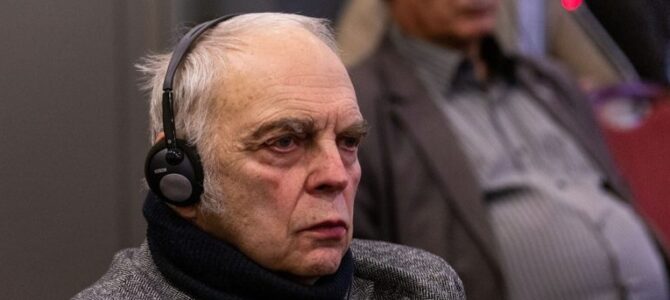
The Lithuanian Jewish Community mourns the death of the famous Lithuanian filmmaker and cultural scientist Pranas Morkus (1938-2022) and we extend our most sincere and deepest condolences to his family members and friends.
Morkus was born February 18, 1938, in Klaipėda to the family of theater actress Galina Yatskevich. From 1955 to 1957 he was a student at the Lomonosov Philology Department of Moscow State University, and from 1957 to 1960 at the History and Philology Faculties of Vilnius University.
From 1962 to 1964 he was attended the highest-level courses for scriptwriters and directors in Moscow. He was a member of the Lithuanian Union of Cinematographers. From 1960 to 1962 he was editor-in-chief of radio theater for the Television Radio Committee of the Lithuanian Soviet Socialist Republic, and from 1968 to 1970 he served as editor-in-chief for the creative body Lietuvos Telefilmas.
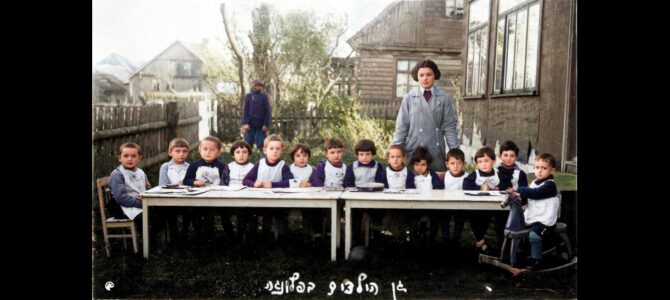
Photo: Jewish nursery school in Plungė, Lithuania. Almost no Jewish children survived in Lithuania. Photo source: Screenshot from the documentary J’Accuse
Renowned cantors unite to give their voices to Baltic Truth premiere
There were very few survivors from Lithuania. In the villages, there were almost none. We know what happened in some locations because we have testimonies from some survivors.
Yakov Zak testified about the Lithuanian Holocaust: “The rabbi of Kelmė, Kalmen Benushevits, who had escaped to Vaiguva at the outbreak of the war, had been brought together with the Jews from Vaiguva. He had been forced to kneel next to the pit the entire day. He had quietly whispered a prayer, watching while the Jews were shot. After all the Jews were shot, he was shot as well.”
And:
“The mystic religious melodies of the yeshiva students, their rabbis and leaders were eternally silenced. The town was ruined down to the foundations; the Jewish community of Kelmė was ruined forever. Peasants also related that while the yeshiva students were being taken to be shot, they did not weep. Like stone statues, they moved slowly, with their eyes raised to the sky, murmuring prayers.”
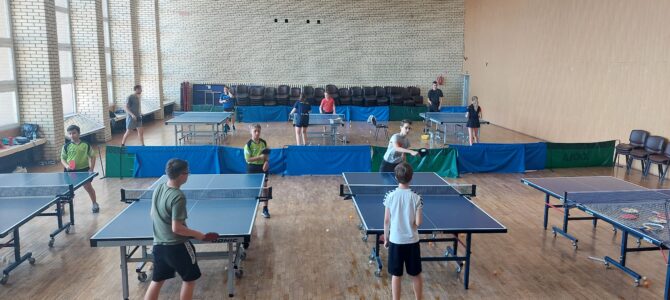
The ping-pong camp supported by the Goodwill Foundation and the Lithuanian Jewish Community from August 1 to August 25 at the Simonas Daukantas pre-gymnasium in Vilnius has ended. Some 27 young athletes, most of them from the Sholem Aleichem ORT Gymnasium, attended. The three-week intensive workshop was taught by Khen and Neta Alon and Šimonas Lukša.
A new season of training begins September first, twice weekly at Sholem Aleichem and at the Simonas Daukantas pre-gymnasium. For more information contact Neta at 862957005 or Khen at 861375124, write an email to stalotenisoklubas@yahoo.com.
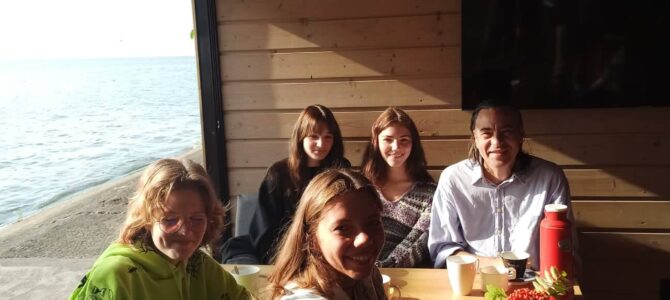
The Jerusalem of the North Orchestra Camp for children and young people was held in Lithuania’s sea-side resort Preila over the summer with about 20 young people from music schools in Vilnius, Kaunas, Trakai, Šiauliai, Panevėžys and Klaipėda attending. They held daily repetitions, improvisational evenings and music-reading at the public library in Preila in the evenings. The final joint concert with the Vilnius St. Christopher’s Chamber Orchestra was performed August 25 at a church in nearby Nida, attended by parents, local residents, vacationers and others.
In addition to music, students learned dance from physical therapist, psychologist and dancer Kamile Pundziūtė; attended lessons on Litvak history, traditions and culture under the tutelage of Algirdas Davidavičius and went on cultural tours of the local area with historian, guide and writer Raimonda Meyer.
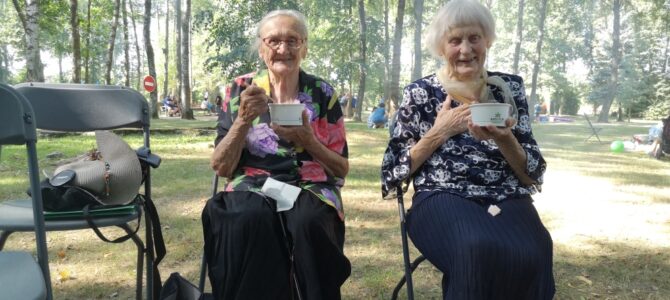
On the last weekend of summer we participated in the Blue Family Picnic which has been held in the Šeduva city park for seven years now. The Blue Family Picnic is intended to strengthen community, reduce social inequality and carry on family traditions.
We came up with all sorts of activities for attendees, including recognizing Jewish religious regalia, teaching them to write their names in Hebrew, a puzzle made up of period photographs of the town/shtetl, how to make traditional Sabbath challa and how to set the Sabbath table. Younger attendees made models of the shtetl, learned how to arrange food items on the plate for Passover seder and spun and taught other children to spin the dreidl. We treated everyone to traditional Litvak dishes as well.
So many friendly and eager to learn families came to the picnic. We wanted to share with them in a fun way the culture and traditions of the Jewish community of Šeduva and to remind them of the town’s not-so-distant past, the shtetl of Šeduva where Jews and Lithuanians lived peacefully together. Two special guests attended, two women from Šeduva for whom the shtetl isn’t lost in the mists of time. They spent their childhoods in the shtetl and have shared their memories with us numerous times.

We wish a very happy birthday to Larisa Vyšniauskienė, guardian of the eternal creative flame of the Fayerlakh Jewish song and dance ensemble. We wish you even greater success, health and artistic achievement! Mazl tov. Bis 120!
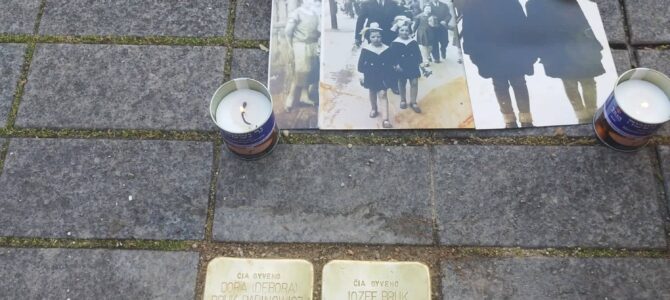
The Lithuanian Human Rights Center is responsible for the laying of six new memory stones dedicated to the memory of the Rabinovitch family at Gedimino prospect nos. 37 and 46 in Vilnius.
Lithuanian Jewish Community chairwoman Faina Kukliansky attended the unveiling ceremony and said: “Today I attended a very moving ceremony. Next to the buildings located at Gedimino prospect number 37 and number 46 six memory stones commemorating the Rabinovitch family were laid. They were murdered at Ponar. I am glad their memory and the memory of their relatives has come back to Vilnius. Thank you to the relatives who found the energy to preserve the memory of their loved ones and to travel to Vilnius for that purpose.”
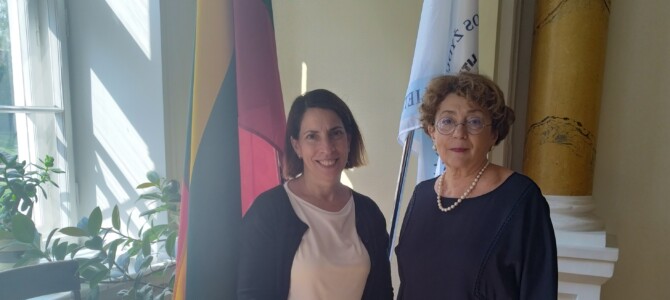
Newly-appointed Israeli ambassador Hadas Wittenberg Silverstein visited the Lithuanian Jewish Community where chairwoman Faina Kukliansky and the Jewish community in Lithuania wished and wish her meaningful work and creative joint initiatives with the LJC. Chairwoman Kukliansky also introduced the new ambassador to Rozeta Ramonienė, the director of the Former Ghetto Prisoners Welfare and Support Fund.
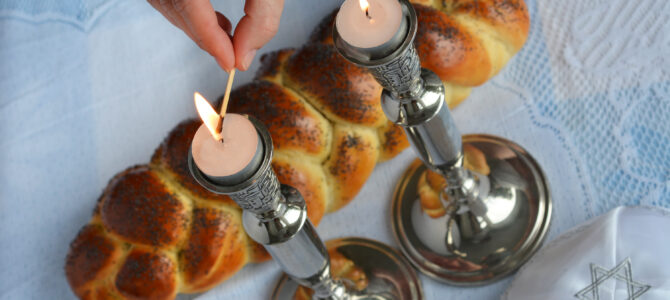
The Sabbath begins at 8:08 P.M. on Friday, August 26, and concludes at 9:22 P.M. on Saturday in the Vilnius region.
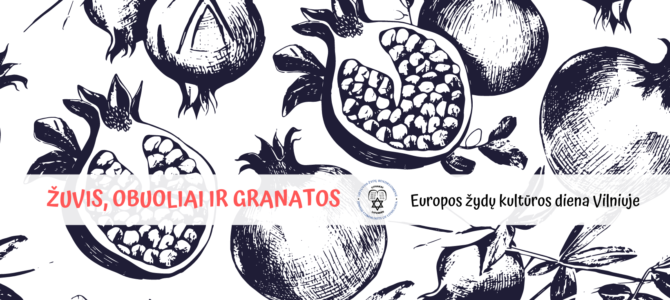
This year will be the seventh the Lithuanian Jewish Community is holding events for the European Days of Jewish Culture. This year’s theme is renewal.
Renewal is woven into almost all aspects of Jewish life. Jewish life is continually building on the past in new ways, bringing a sense of constant change along with a reassuring sense of continuity. The Jewish New Year opens with the festivals of Rosh Hashana and Yom Kippur. These holy days through their traditions and prayers present an opportunity to reflect on and acknowledge our past actions while looking ahead with new resolutions, optimism and determination. During this period we reconcile personal and communal differences within ourselves and with others as we actively strive to renew our aspirations for the coming year, and beyond.
We invite you to attend the events, all of which are free and open to the public.
Register here, space is limited.
Program:
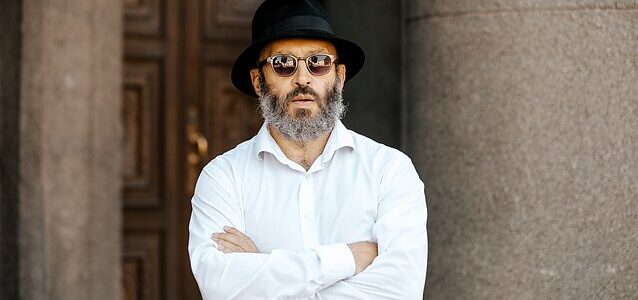
The Lithuanian state radio and television website has an extensive interview with Litvak musician Arkadijus Gotesmanas on music, life and upcoming appearances in Lithuania.
Full article and interview in Lithuanian here.
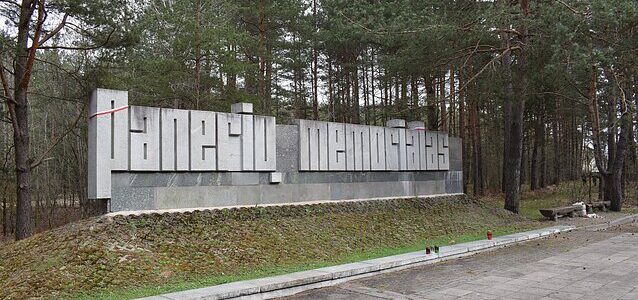
The Vilnius city council has decided to change the name of the portion of Agrastų street leading to the Ponar Memorial Complex to Memorialo (Memorial) street. They also resolved to name several unnamed roads in and around the village of Ponar.
We extend our deepest condolences on the death of Polina Zingerienė at the age of 101 to her sons Markas and Emanuelis and her many friends and relatives.
She was born in Kaunas where she was graduated from high school. Her adolescence was cut short by World War II. She was imprisoned in the Kaunas ghetto and later sent to a concentration camp. After the Allies liberated the camp, Polina returned to Kaunas.
Her painful experiences and struggle to survive the Holocaust led her to go into medicine. She received in diploma in natal and developmental nursing. She worked in her field of medicine till the age of 76.
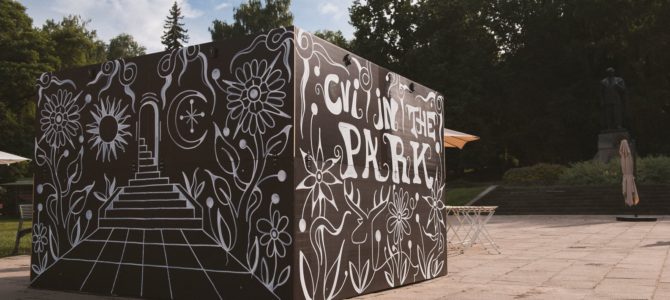
Come to celebrate the last sabbath of the summer at the Cvi Park Israeli food kiosk with Israeli dancing. The event starts at 6:00 P.M. on Friday, August 26. The event is free and open to the public.
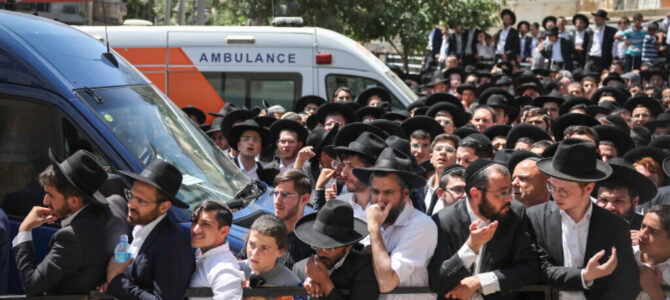
Police and emergency services spread out in force along procession’s route in the capital; event expected to disrupt traffic
Thousands of people are now taking part in the Jerusalem funeral of Rabbi Shalom Cohen, the ultra-Orthodox Shas Party’s spiritual leader.
Police are spread out in force along the funeral procession’s route from the Porat Yosef Yeshiva that he led in Jerusalem’s Geula neighborhood toward the Sanhedria cemetery.
Traffic disturbances are expected.
Large numbers of emergency personnel are also on hand. Magen David Adom has urged attendees to bring water, avoid crowding and refrain from climbing on roofs or poles to get a better view.
Full story here.
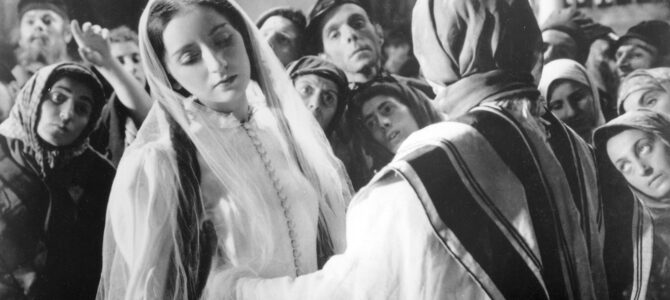
The Jerusalem Theater Archive and Museum is hosting an exhibit to mark the 100th anniversary of the staging of S. An-sky’s “Dybbuk” at the Habima Theater in Moscow. The exhibit opened August 8 at Hebrew University on Mount Scopus in Jerusalem, according to Birobaidzhaner Shtern.
An-sky’s “Dybbuk, or, Between Two Worlds” was written in Yiddish. The Moscow production was translated to Hebrew by Evgeny Vakhtangov and Haim-Nahman Bialik. The Vilner Troupe presented the play in Yiddish in Warsaw in 1920, directed by Dovid Herman. The Polish film “Dybbuk” directed by Michał Waszyński was shot in 1937 and marks the birth of Yiddish cinema. The Hebrew-language production in Moscow, however, is considered special because its success became a kind of calling card for Habima, which in turn eventually became the National Theater of Israel.
Full article in Yiddish here.